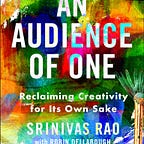Why a Peak State of Mind is a Priceless Asset
A few weeks go I published a piece titled 4 ways to eliminate decision fatigue from your life. But I kind of put the cart before the horse. I never talked about why you should do it. When we know why we’re actually doing something, we’re more likely to not only to do it but benefit from it. So let’s talk about why.
According to Neil Pasricha, author of The Happiness Equation, the average person makes over 300 decisions a day. On the surface most of those decisions appear to be fairly inconsequential:
- What am I going to eat?
- What am I going to wear?
- Should I check email?
- What route will I take to work?
But every one of those decisions depletes willpower, resulting in decision fatigue, and reducing our ability to make good decisions.
Listen to Unmistakable Creative Interview with Neil Pasricha
Willpower
In his book Willpower, Roy Baumeister discovered that parolees who had their cases heard early in the morning had a much higher chance of being paroled. For those who had their cases heard close to lunch, the percentage declined significantly. A hungry judge whose willpower has been depleted doesn’t make for a favorable hearing.
Another story from Baumeister’s book is that of New York Governor Elliot Spitzer who destroyed his career because of a prostitution scandal. Paradoxically he was also the same governor that “spearheaded the prosecution of two alleged prostitution rings, according to the Times.” Not only that, he used funds from accounts that he knew would be clearly seen by people in his administration. Maybe he’s crooked because he’s a politician.
But, for somebody who is smart enough to rise to the level of the governor not to be cover their tracks doesn’t really make any logical sense. Baumeister says that maybe decision fatigue played a role.
For most of us, the consequences of decision fatigue are not going to be that catastrophic. However, if we eliminate or automate low-value inconsequential decisions from our lives, our willpower can be conserved for high-value creative output. And we can maintain a peak state of mind for as much of the day as possible.
The Invisible Cost of Decision Fatigue
Rather than look at it through the lens of productivity, which I’ve done in previous posts, let’s look at it through the lens of wealth. Assume for now that your time is worth $5000.00/hr. Think about how that would change all of the following:
- The things you’re willing to put up with
- The lines you’re willing to wait in
- The tasks you’re willing to do vs outsource
Usually, a common argument is that people can’t afford to get rid of some of these thing. But across the board when people talk about how they’ve accumulated their wealth, they say they started doing this before they were wealth.
- In his book How to Get Rich Maxim Magazine founder Felix Dennis says “I only got rich when I began to delegate and ease up on my work schedule
- In his book The No BS Guide to Wealth Attraction in the New Economy, Dan Kennedy says that he’s deliberately made himself incredibly hard to reach, and it’s been this way since long before he was rich.
- In an interview, Dan Martell told me that hasn’t set foot in a grocery store in years. If you’re building and investing in companies, the opportunity cost of the going to the grocery story is probably quite high.
Listen to the Unmistakable Creative Interview with Dan Martell
It all Comes Down to State of Mind
A few nights ago I was talking to my business partner Brian about the hassle and headaches of airport security. Between a book coming out and doing more speaking, I’ve spent quite a bit of time in airports in the last 6 months. The cost for a global entry pass is somewhere under 200 dollars for about 5 years:
- No more TSA lines
- No more customs lines
Now if you assume your time is worth $5000 an hour, that pass not only pays for itself. Not having it actually costs you money, potentially a lot of money over 5 years.
You save time. You save money. But, my business partner Brian wisely observed that you save something far more valuable, your state of mind.
Imagine the difference in your state of mind if you breezed through security vs going through the standard nonsense you normally do. How much will that impact your productivity and your ability to actually spend time on incredibly high impact activities?
Consider the difference between a lunch hour spent in line at the post office or printing a label on Stamps.com and doing everything you could do at the post office from the comfort of your phone.
If you’ve seen the TV show Billions, you’ll see that Bobby Axelrod, a hedge fund Billionaire employs a full-time performance coach with a medical degree to work with his staff. Her job is to put everyone in the proper state of mind. With that much money on the line, a two percent increase in performance justifies the cost of somebody like a performance coach.
Successful people don’t just do this because for the sake of convenience. Not eliminating decision fatigue and many of the things that are just defaults literally cost them money.
And being able to stay at a peak state of mind throughout as much of your day as possible is a priceless asset.
I’m the host and founder of The Unmistakable Creative Podcast. Every Sunday we share the most unmistakable parts of the internet that we have discovered in The Sunday Quiver. Receive our next issue by signing up here
